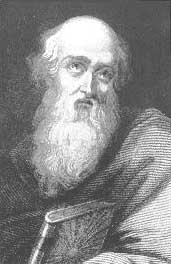
THE MARTYRDOM OF POLYCARP.
DURING the early days of the Christian religion, there was at times great persecution of those who loved the Lord Jesus and served him. It was during one of these persecutions that there occurred what is called the martyrdom of Polycarp.
Polycarp was the most distinguished Christian of the East. He had heard the apostle John, and had long presided as bishop over the See of Smyrna. Many Christians suffered at this city in the persecution under Marcus Aurelius, A. D. 167; and Polycarp, in obedience to the command, "When they persecute you in one city, flee ye to another," went to a house a few miles from Smyrna, and there passed his time in praying for the church of the Lord Jesus. His place of concealment being betrayed by two slaves, whose confession had been extorted by torture, he calmly said, "The will of God be done!"
Three days before he was taken, he had a vision, in which it seemed to him that his bolster was on fire. Then he said to his friends, "I shall be burned alive." The horsemen who came to take him arrived at his house late on Friday evening.
He came down and spoke to them.
"What!" they cried, "where was the use of such haste and such a multitude to take one good old man?"
He ordered that supper should be made ready
for them, and requested that he might have one hour for prayer. He spent two hours thus, and prayed by name for all whom he had known in his whole life. Then they set him on an ass—for he was too old to 'walk—and carried him to the city. He was met by Herod, the irenarch, and his father, Nicetus, who took the bishop into their own carriage, and tried to persuade him to submit to the two tests by which Christians were tried—the salutation of the emperor by the title of lord, and sacrifice. As he would not consent, their compassion gave way, and they hastily thrust him out of the chariot.
The next day he was brought before the proconsul. "Come," said the magistrate, "have some pity on yourself and your great age. Only swear by the fortune of Caesar; only say, 'Away with the impious men' [he meant the Christians], and you shall be safe."
Polycarp looked sternly around the theater and cried, "Away with the impious men!" "Swear," persisted the proconsul; " or at least speak evil of Christ."
"Eighty and six years," replied the bishop, "have I served him, and he hath ever been a good Master to me. How, then, can I blaspheme my King and my. Saviour?"
The proconsul threatened to expose him to the wild beasts.
"It is well for me," said the noble Christian,
"To be speedily released from this life of misery."
The proconsul threatened to burn him alive.
"I fear not the fire that burns for a moment," was the calm reply; "thou knowest not that, which burns forever and ever."
His countenance was full of peace and joy, even when the herald advanced into the midst of the assemblage, and thrice proclaimed, "Polycarp hath professed himself a Christian."
The Jews and heathens, who were full of rage against the Christians, demanded that a lion should be let loose upon Polycarp; and when it was said that this could not be because the games were over, a great cry arose that he should be burned alive.
Then the multitude rushed—the Jews first—to the woodshops and the baths to find fagots; and they raised a pile in the midst of the theater.
When they were about to nail him to the stake, he said, "Leave me. He that gives me power to endure the flames will give me grace to abide them without your nails."
They contented themselves with tying him.
Then he prayed a wonderful prayer, in which he said, "I render thanks to Thee that thou hast graciously thought me worthy of this day and of this hour, that I may receive a portion in the number of Thy martyrs, and drink of Christ's cup, for the, resurrection to eternal life both of body and soul!"
To those who looked on it seemed as if the fire was kindled in vain. It arose curving like an arch around the serene victim, or like a sail swelling with the wind, and left the body unharmed. To the eyes of the Christians his body shone in the midst like gold or silver in the furnace, and delicious odors, like myrrh or frankincense, breathed from his body.
The pagans, finding him unhurt, called for the executioner to come and dispatch the victim; and it is said that when he had struck Polycarp, the blood flowed out so freely that the flames were extinguished.
This noble bishop was at least a hundred years old at the time of his martyrdom; for he had been a bishop seventy years. He won hearts easily by his genuine spirit of Christian love and gentleness;
and yet we have seen that he could be firm and unyielding when the test came.
Selected.